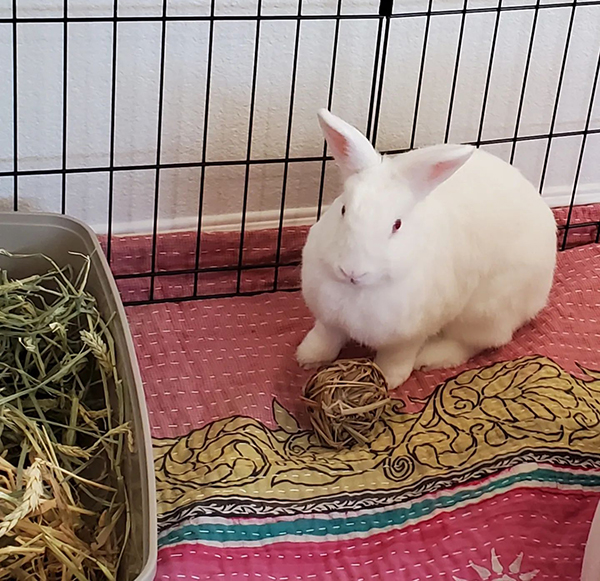Wave Wire Services
LOS ANGELES — With Easter approaching, animal rescue organizations in Southern California and elsewhere are once again urging people to avoid the temptation to purchase or adopt bunnies as Easter gifts for children.
They say what begins as a well-meaning gesture often leads to abandoned bunnies when the novelty wears off and families realize they’re not equipped to properly care for the animals.
“Every year, countless rabbits suffer and die because people buy them as living toys for their children,” the Los Angeles Rabbit Foundation said in its annual Easter message last week. “Don’t be a part of the problem. Choose chocolate for Easter. And if rabbits are for you, adopt, don’t buy from a breeder or pet store. Please share this message far and wide.”
The L.A. Rabbit Foundation is a chapter of House Rabbit Society, an international nonprofit headquartered in Richmond, California, that offers education about rabbits and works to find permanent homes for abandoned bunnies.
“The typical ‘Easter bunnies’ sold illegally on the streets or in pet stores are tiny babies, taken from their mothers before they are properly weaned. Many of these baby rabbits will die soon after purchase — hardly a fun experience for kids,” the organization said in its 2021 Easter message. “When you adopt a rabbit, you’re making a commitment to support a small, fragile prey animal over the next 10-15 years.”
Bunny World Foundation, a Los Angeles-based nonprofit that’s rescued thousands of unwanted rabbits from shelters and owner surrenders since its founding in 2008, typically sees a major surge in dumped bunnies in the weeks and months following Easter.
“Easter bunnies who magically appear and lay multi-colored eggs shown on greetings cards and cartoons are nothing but a fantasy,” says Lejla Hadzimuratovic, the foundation’s founder and president. “The reality is that all year long bunnies, who appear more like urban chickens, are dying by the millions, slaughtered for food, fur and skin, tortured in laboratory experiments and confined to shoebox-sized cages, neglected, and exposed to harsh temperatures in commercial breeding factories.”
Hadzimuratovic adds that despite an ordinance prohibiting the sale and purchase of live animals on the streets of Los Angeles, “the year-round live animal market in L.A.’s Fashion District, specifically Santee Alley, is thriving. Typically bought on a whim as a toy for a child, they often live a desolate life in the corner of a filthy cage without enrichment until they are abandoned to a shelter or die of neglect.
“Every year, we scream from the top of our lungs that bunnies don’t make good Easter gifts, and still, those reminders go unheeded.”
Bunny World Foundation will be attending the L.A. Arboretum’s “Spring Fling” event April 15 to educate the public about the realities of caring for domestic rabbits. They’ll be bringing along some of their rescued bunnies who are available for adoption, for those who are serious about wanting bunnies in their lives.
To accommodate the high number of bunnies the group rescues from Los Angeles city shelters — some of whom have special medical needs that place them at greater risk — the foundation offers a free foster program in which people care for the animals, help promote them on social media and bring them to weekly adoption events until they find a permanent home.
Rabbits are not low-maintenance pets. They require feeding, cleaning, and humane indoor housing in a bunny-proofed room and veterinary care can be expensive.
They’re also not ideal pets for small children, as they respond best to quiet energy and can be easily spooked by the hyperactivity of a child. Most bunnies do not like to be picked up or held, may scratch or bite in an effort to get free, and can be seriously injured or even killed if they’re dropped.
For those with children, rescue groups and animal control officials recommend buying a stuffed toy bunny or chocolate candy rabbit for kids’ Easter baskets.
Retail sales of rabbits, dogs and cats is prohibited in California, but direct sales are still permitted, including online, and illegal street sales occur in urban areas where baby bunnies are sometimes deceptively marketed as adult “dwarfs.”
People for the Ethical Treatment of Animals also offers “9 Reasons Why You Shouldn’t Buy a Bunny” at www.petakids.com/save-animals/never-buy-bunnies/.
Advocates for the animals do want them to be adopted into loving homes, but they stress that adoption is a serious commitment that requires a willingness to learn the ropes.
All five shelters in the Los Angeles Animal Services system have rabbits available for adoption, as do other Southland city and county shelters, and private rescue groups offer support and mentoring for new bunny owners. The House Rabbit Society has resources for learning about proper rabbit care, which can be found at https://rabbit.org/.
A few basics:
- Domestic rabbits should be kept indoors at all times.
- They should be fed a diet of unlimited timothy hay and a daily portion of leafy greens, plus pellets and alfalfa hay for rabbits under 6 months.
- They should never be kept in cages, as they need room to hop around and exercise their legs.
• They need to be thoroughly groomed every two to three months to remove excess fur and have their nails trimmed.
- They are aggressive chewers, and need to be kept away from electrical cords and anything that can be dangerous if ingested, such as taped or glued boxes.
- Bunnies who stop eating or appear to be in pain need immediate care from a veterinarian trained in the care of rabbits. Bunnies who stop eating can die within 36 hours. Not every vet has expertise with rabbits, so owners should find the one nearest them that they can rely on in an emergency.
More information can be found at www.bunnyworldfoundation.org, or www.larabbits.org/.












